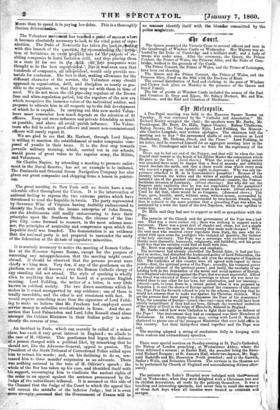The Volunteer movement has readied a paint of success where
it becomes absolutely necessary to look to the vita/ point of orga- nization. The Duke of Newcastle has taken Pm
with this branch of, the Aneatibh; torbit-: ton of battalios in,.eveYai tabsiitle bate for 'tiaj-pttepoie of 'en- abling companies to lesiai 'battalion drill, and this placing them in a state fit for use in the .fol. :IVt.::Arit companies were thought to be the best orgatezitfoi•% j3ittit Iva soon seen that hundreds of companies' all iddejaeitaent, would only provide ma- terials for confusion. The fact is that, making allowance for the different character of the service, the Volunteer army should approach in organization, drill, and discipline as nearly as pos- sible to the regulars, so that they may act with them in time of need. We do not mean the old pipe-clay regulars of the Brown Bess and ultra-regulation period, but the regulars of the new era which recognizes the immense value of the individual soldier, and proposes to educate him in all respects up to the fall development of which he is capable. In carrying out this new model Volun- teers must remember how much depends on the selection of fit officers. Keep out mere influence and private friendship as much as possible, and above all avoid parish influence. The Volun- teers who fail to select good officers and smart non-commissioned officers will surely repent it.
We are glad to see that Mr. Herbert, through Lord Ripon, is willing to sanction the establishment of cadet companies com- posed of youths in their teens. It is the first step towards juvenile military training, which, carried out in our schools, wankl prove of great value to the regular army, the Militia,
• and Volunteers.
Sir Charles Napier, by attending a meeting to promote enlist- ment in the Naval Reserve has set an example to be imitated. The Peninsula and Oriental Steam Navigation Company has also given our great companies and shipping firms a lesson in patriot- ism.


























 Previous page
Previous page